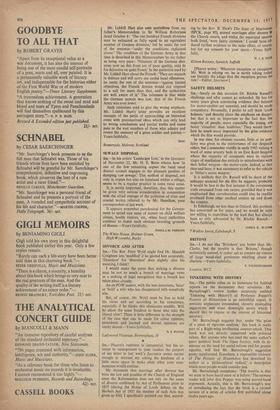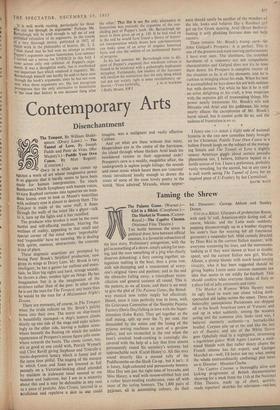TINKERING WITH HISTORY Sig,—The public relies on its historians for
faithful reports on the documents they scrutinise. Mr.
Barraclough's review (rather accurately entitled 'Tinkering with History') of Professor. Popper's Poverty of HiStoricism is an unfaithful report. It contains unpleasant innuendoes, cleverly misleading suggestions and some downright errors which I should like to expose in the interest of historical accuracy.
Mr. Barraclough suggests that, under 'the guise of a piece of rigorous analysis,' this book is really part of a Right-wing intellectual counter-attack. This book was not directly concerned with political values. But anyone who has read the same author's more political book The Open Society, with its in- sistence on the need for social reform and for greater equality, will find Mr. Barraclough's suggestion pretty uninformed. Elsewhere, a responsible reviewer of The Poverty of Historicism has described its author as a 'philosophical radical,' a description which most people would consider just.
Mr. Barraclough complains : 'The trouble is that we seem to have heard most of it before.' The unwary reader will infer that Popper was using second-hand arguments. Actually, this is Mr. Barraclough's way of introducing the fact that the book is a revised version of a series of articles first published about twelve years ago.
'It is well worth reading, particularly by those who can see through its arguments.' Perhaps Mr. Ilarraclough will be kind enough to tell me of any Published refutation of its arguments. In the course of a very thorough survey, published in 1952, of recent work in the philosophy of history, Mr. L. J. ,Cohen stated that he had seen no attempt to refute YelVer's arguments against historicism. Last summer I carried out a survey for UNESCO in this field. I came across only one criticism of Popper's argu- ments. It was a thoughtful study, but it overlooked One important fact which rendered it nugatory. Mr. Barraclough himself can hardly be said to have seen through the book's arguments, since he has not even seen what those arguments are. His last paragrapn presupposes that the only alternative to historicism Is 'the view that history is one damned thing after
the other.' That this is not the only alternative to historicism was precisely the argument of the con- cluding part of Popper's book. Mr. Barraclough ap- pears to have given up on p. 149. If he had read on to the end he would have found a theory of histori- cal interpretation which shows how anti-historicists can make sense of an array of singular historical facts, and also the outline of an institutional theory of progress. In his last sentence Mr. Barraclough tries to dis- pose of Popper's argument that wholesale reform is bound to be irrational with a pathetically inadequate metaphor. Fortunately, few readers of the Spectator will swallow his insinuation that the only thing which can put our society right is some revolutionary up-







































 Previous page
Previous page